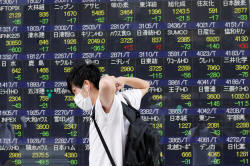Upbeat China data bolsters sentiment, oil tumbles
 Send a link to a friend
Send a link to a friend
 [November 15, 2021] By
Dhara Ranasinghe [November 15, 2021] By
Dhara Ranasinghe
LONDON (Reuters) -World stock markets held
near recent record highs on Monday as upbeat Chinese economic data eased
concerns about a slowdown in the world's No.2 economy, although falling
mainland house prices and rising COVID cases across Europe tempered the
optimism.
Annual growth in Chinese retail sales and industrial output beat
forecasts, with the bounce in consumption a positive given pandemic
restrictions.
But in a negative sign for the stressed housing market, China's new home
prices fell 0.2% month-on-month in October, the biggest decline since
February 2015. And economists at CBA said there was a chance the Chinese
central bank would cut bank reserve requirements (RRR) this week to
support activity.
MSCI's broadest index of Asia-Pacific shares outside Japan rose 0.4%,
while MSCI's world stock index hovered near last week's record peaks.
Australia's dollar also took comfort from the Chinese data, rallying
almost half a percent.
Europe's broad STOXX 600 index briefly touched a fresh record high and
U.S. equity futures pointed to a firm open for Wall Street .

"The big growth worry right now is China," said Timothy Graf, head of
macro strategy for EMEA at State Street in London.
"And I guess today, it's good to see that the domestic side is perhaps
not quite as vulnerable as was perhaps previously feared."
Japan's Nikkei closed almost 0.6% higher. Data showing economic activity
shrank by more than expected in the third quarter boosted expectations
for aggressive fiscal stimulus.
Yet there was also a note of caution in world markets, with latest COVID
headlines tempering sentiment in Europe and supporting safe-haven bond
markets.
Austria slapped a lockdown on people unvaccinated against the
coronavirus on Monday as infections rose across Europe, with Germany
considering tighter curbs and Britain expanding its booster programme to
younger adults.
Europe has again become the epicentre of the pandemic, prompting some
countries to consider re-imposing restrictions in the run-up to
Christmas and stirring debate over whether vaccines alone are enough to
tame COVID-19.
Brent crude futures tumbled 1.6% to $80.85 a barrel on expectations of
increasing supply, with higher energy costs and rising COVID-19 cases
also seen weighing on demand.
U.S. West Texas Intermediate crude lost 1.4% to $79.65. [O/R]
Elsewhere, the United Nations climate conference in Scotland managed to
hammer out a deal on emissions, but only by watering down a commitment
to phase out coal.
[to top of second column] |

A man wearing a protective mask, amid the COVID-19 outbreak, walks
past an electronic board displaying Japan's Nikkei index outside a
brokerage in Tokyo, Japan, September 21, 2021. REUTERS/Kim Kyung-Hoon

The agreement hurt miners' shares. China Shenhua Energy and Yanzhou Coal
fell 1% and 2.4% respectively in Hong Kong; UK-listed miners Glencore,
Rio Tinto and Anglo American tumbled 1.4-2.4%.
Royal Dutch Shell was also in focus after announcing it would scrap its
dual share structure and move its head office to Britain from the
Netherlands.
CENTRAL BANK WATCH
Major central banks' response to the emergence of inflation pressures
also remained in the market spotlight.
Persistent supply chain bottlenecks and soaring energy costs are slowing
euro zone growth and will keep inflation high for even longer than had
been thought, European Central Bank chief Christine Lagarde said on
Monday.
After bond yields rose sharply last week following strong U.S. inflation
data, a calmer tone resurfaced in major bond markets.
Germany's 10-year Bund yield was a touch lower at -0.26%, and benchmark
10-year U.S. Treasury yields fell 3 basis points to 1.55% after jumping
11 bps last week as markets positioned for early monetary tightening by
the Federal Reserve.
"On the inflation side, the term transitory isn't appropriate for the
conditions we're seeing," said Seema Shah, chief strategist at Principal
Global Investors in London.
"We see inflation staying higher for longer. One reason that (bond)
markets sold off last week was that there were signs that the rise in
price pressures was broadening out".
Higher U.S. yields have combined with general risk aversion to benefit
the dollar, which just boasted its best week in almost three months.
Against a basket of currencies, the dollar was a touch lower at 95.058
but near its highest since July 2020.
It held at 113.83 yen , while the euro steadied at around $1.1445 but
remained vulnerable.
Mark Haefele, UBS Global Wealth Management's CIO, said he saw further
dollar strength against the yen, euro and Swiss franc and forecast the
euro to fall to $1.10 by end-2022.
"We advise clients to position for a stronger dollar, with currency
trades being one means of adding yield to portfolios," he said in a
note.
(Reporting by Dhara Ranasinghe; Additional reporting by Wayne Cole in
Sydney; Editing by Angus MacSwan and Chizu Nomiyama)
[© 2021 Thomson Reuters. All rights
reserved.] Copyright 2021 Reuters. All rights reserved. This material may not be published,
broadcast, rewritten or redistributed.
Thompson Reuters is solely responsible for this content.
 |